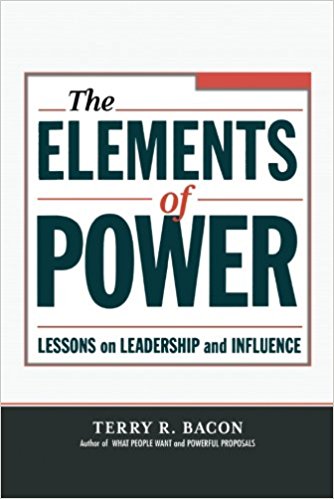The Elements of Power Summary

4 min read ⌚
 Lessons on Leadership and Influence
Lessons on Leadership and Influence
Are you pursuing a leadership role? If so, being a leader is more than just having a decision-making authority.
Manage building one-character trait at a time followed up by one relationship.
Who Should Read “The Elements of Power”? And Why?
Newer role models characterize organizational power as an entity linked with several vital features: “role – power, resource management – power” (including skills and talents), “access to information – power, network and reputation power”.
We prescribe “The Elements of Power” to all people willing to add a little bit of restlessness and devotion to their lives. Bacon unselfishly shares this tool and outlines all the steps needed for a person to become a dominant leader.
About Terry R. Bacon
Terry R. Bacon was born in 1947, in Kansas – the United States but grew up in Missouri. He obtained his Ph.D. from the American University in Washington, DC in Literary Studies back in 1977.
After graduation, Terry moved to Utah where he became an adjunct professor.
He is also the founder of Lore International Institute. During his career, Terry wrote more than 25 books including: What People Want, Powerful Proposals, Elements of Influence, Adaptive Coaching and others.
“The Elements of Power Summary”
Organizational hierarchy of power differs on many grounds. Managers, executives, consultants, and other stakeholders appreciate the opinion of those highly capable individuals – referring to their access to various internal and external information.
The gain generated from them covers many aspects ranging from business related methodologies to personal perspectives. People nowadays, want to be heard, and that doesn’t only apply to organizations but on all levels. However, to gain a privilege like that one must pay the price of commitment.
Above all emerges the conceptual integration point, that merges both acceptance and knowledge. Take your regular daily dose of wisdom stimulated by self-appreciation, make the people working with you feel the energy arising from your actions.
Utilize all the elements of power, don’t grumble about the future, make your presence felt and spark something in other people. The process of gaining acceptance is much more complicated than any other because organizational subjects can handle your superiority but they will not accept you as a leader.
The acquisition of status manifests the importance of one person on an organizational level. If you want to be recognized as someone who strives for power and authority, you must lure them to believe in your ideas and concepts.
The cultivation of appropriate management skills comes highly recommended for those managers, executives whose interest is connected to centralized dominance. It all comes down to the type of relationship you have with your associates. Power not only that it reflects a formal position but also your interpersonal skills and management abilities.
Make sure that they are aware of your righteous hand among them; like some sort of a handy tool which points them in the right direction. Right movements can easily attain and utilize any source of power which as mentioned above doesn’t arise from a formal authority – obtained as a reward.
Perceiving dominance and control is a process that can be interpreted in various unlimited ways. Some managers mostly focus on internal issues around the centralized power of CEOs and focus on the organizational chart; while others are concerned with external manipulative entities.
Terry R. Bacon yet again pinpoints that “control theories” that can wield more power have to be perceived from a broader perspective.
Another aspect of crucial importance is – individual’s willpower directed towards the ultimate goal. A forward-driven approach is often related to power and represents the embodiment of self-control.
Watching movies can often give you a wrong perception of why people are eager to influence other persons and circumstances. However, you should distance yourself from those shallow thinking-patterns and turn to a more resentful attitude.
If you wish to have access to valuable pieces of information, make yourself visible in the business community. Win their minds, and enter their hearts to grasp all the elements of power.
The author of “The Elements of Power” Terry R. Bacon – Executive development expert, conducts a comprehensive analysis covering many subjects. Control, dominance, and authority are concepts that come with a burden.
Individuals must be aware of this fact because entering unprepared into the bubble of power is not such a good idea. The society compels us to believe that everyone got what it takes to overthrow any other source of power, but usually that’s not the case.
Real leaders and artists are born, you can work on improvements, but in the moment – talent is everything. A lot of examples present in the book are only indicators of how some individuals flourished in literature, arts, politics, sports, music, and business.
Key Lessons from “The Elements of Power”
1. Power from a personal angle
2. Being a boss has nothing to do with being a leader
3. Passion as an integral part of power
Power from a personal angle
From a more personal perspective, people draw a picture of “power” looking from another point of view.
The emphasis falls on self-knowingness, expressiveness, attractiveness, personality, and history – when authority is discussed.
Being a boss has nothing to do with being a leader
The elements of power are reflecting concepts that derive from your mindset.
The special bond existing between success and risk often comes associated with authority and risk-aversiveness.
Leaders tend to get a bit bossy which completely opposes the theory of having a leading edge.
Passion as an integral part of power
Influential people come from all nations, cultures, and religions. If those things divide them, passion connects them.
Their ability to express themselves passionately and use excitement as a tool for stimulating determination separates them from the rest of the ordinary world.
Like this summary? We’d Like to invite you to download our free 12 min app, for more amazing summaries and audiobooks.
“The Elements of Power” Quotes
People want to be influential. Share on X The power of will comes from authentic leadership, and it may be that nothing great was ever created except from this source of individual power. Share on X When you like someone, when you are attracted to him – for whatever reason – you enhance his ability to lead or influence you. Share on X Role power is a function of success. Share on X Skilled networking makes you significantly more influential. Share on XOur Critical Review
This book resolves all the mysteries linked to mediocre and inflexible mindset.
We warmly present this magnificent masterpiece to all managers, executives, owners, and students who fiercely oppose the averageness.









